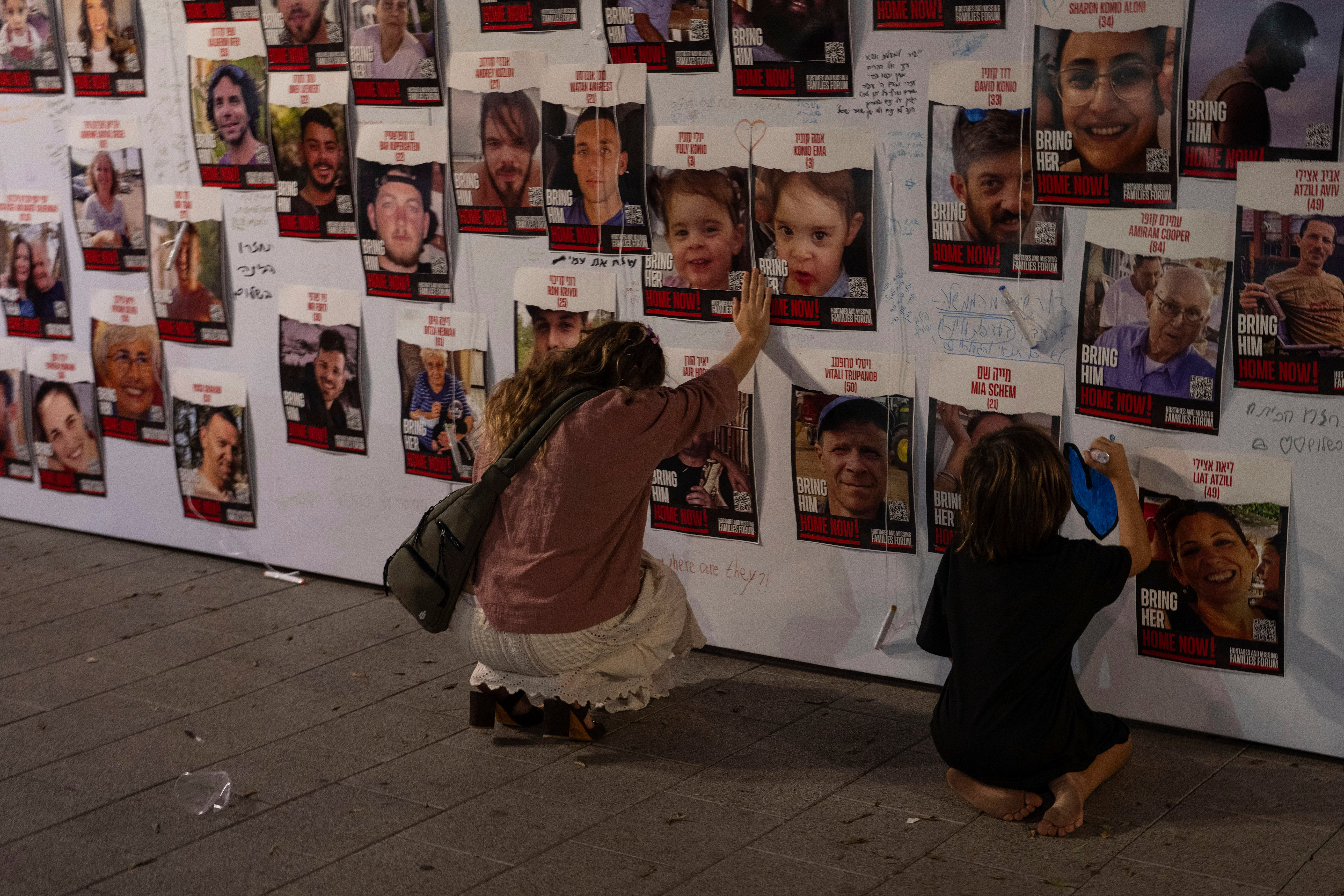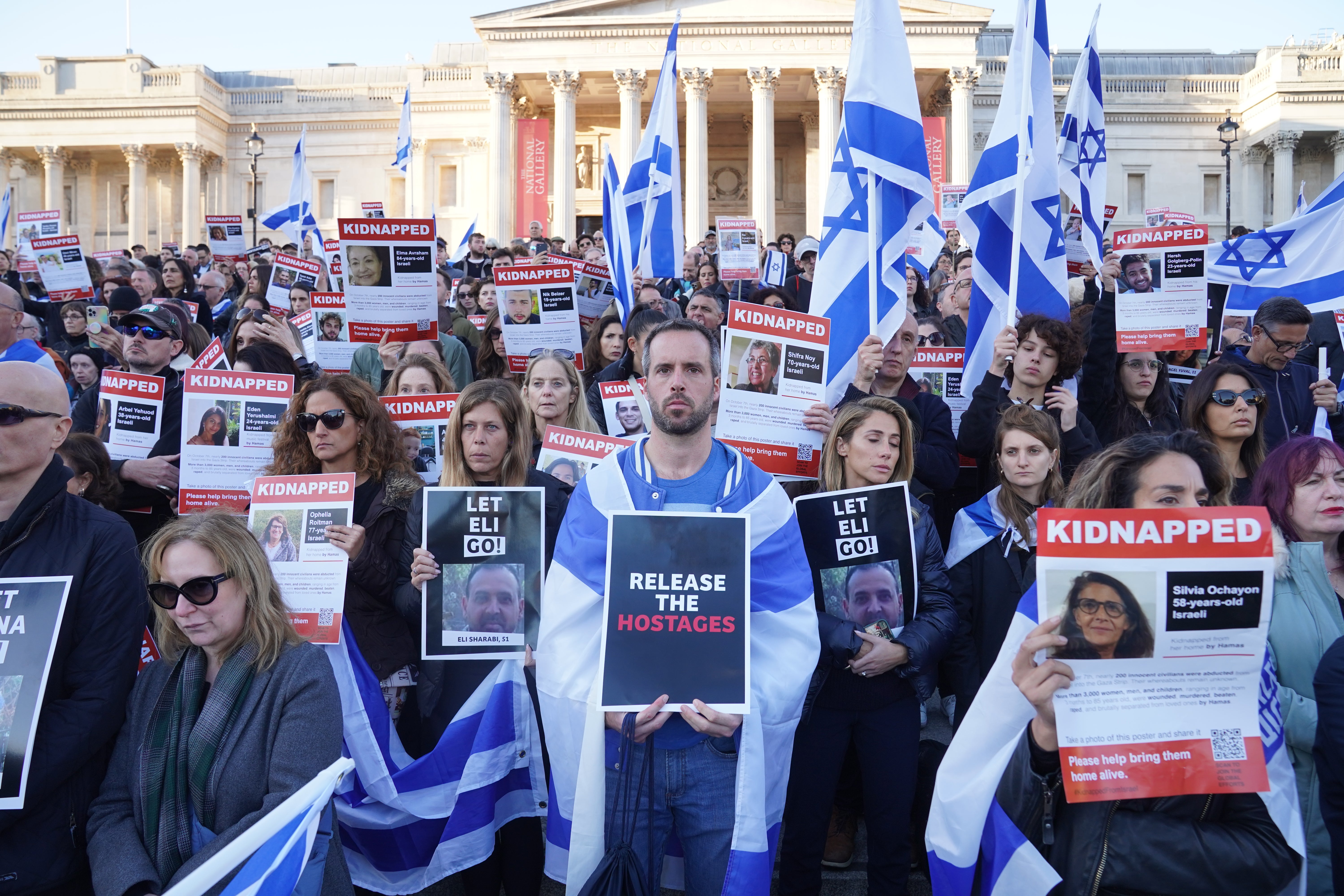Hamas hostage release: Two elderly Israelis leave Gaza after Egypt and Qatar broker deal
Hamas, who took more than 200 hostages in an attack in Israel two weeks ago, said it released the hostages – two elderly Israeli women – on ‘humanitarian grounds’
Your support helps us to tell the story
From reproductive rights to climate change to Big Tech, The Independent is on the ground when the story is developing. Whether it's investigating the financials of Elon Musk's pro-Trump PAC or producing our latest documentary, 'The A Word', which shines a light on the American women fighting for reproductive rights, we know how important it is to parse out the facts from the messaging.
At such a critical moment in US history, we need reporters on the ground. Your donation allows us to keep sending journalists to speak to both sides of the story.
The Independent is trusted by Americans across the entire political spectrum. And unlike many other quality news outlets, we choose not to lock Americans out of our reporting and analysis with paywalls. We believe quality journalism should be available to everyone, paid for by those who can afford it.
Your support makes all the difference.Two elderly Israeli hostages have been released by Hamas in a deal The Independent understands was brokered by Qatar and Egypt.
The two detainees are Yocheved Lifshitz, 85, and Nurit Yitzhak, 79, both kidnapped from the same kibbutz – Nir Oz – near the border with Gaza on 7 October during a cross-border attack that left 1,400 dead and more than 200 people kidnapped and taken to Gaza. Both women are elderly and in need of medical care. Their husbands, who were taken with them, remain in Gaza.
The news came as president Joe Biden told The Independent that the US would not advocate for a deal with Hamas over hostages in return for a ceasefire.
“We should have these hostages released and then we can talk,” Mr Biden said in response to a question at a press conference after the hostage release was announced.
Mrs Lifshitz’s husband Oded is a peace activist and retired journalist who would drive Palestinians who needed medical treatment from Gaza to hospitals in East Jerusalem, said his daughter Sharone, who lives in London. Ms Lifschitz said: “I can confirm that my mother Yochi [Yocheved] Lifshitz was one of two hostages released to the Red Cross this evening.
“While I cannot put into words the relief that she is now safe, I will remain focused on securing the release of my father and all those – some 200 innocent people – who remain hostages in Gaza.”
The grandson of Mrs Lifshitz, Daniel Lifshitz, said: “We are truly hoping that this is just the beginning of the release of all the remaining hostages,” he said. Asked what he would say to her, Mr Lifshitz said: “That I love her.”
Mrs Yitzhak, who also goes by the name Nurit Cooper, was abducted with her husband, Amiram.

The International Committee of the Red Cross (ICRC) confirmed that two hostages had been released, while Egyptian state media reported that the released pair were at the Rafah crossing with Egypt on Monday evening. Egypt's Extra News TV showed footage of two captives being transferred to ambulances.
The ICRC said: “We facilitated the release of two more hostages, transporting them out of Gaza this evening. Our role as a neutral intermediary makes this work possible and we are ready to facilitate any future release. We hope that they will soon be back with their loved ones.”
Abu Ubaida, spokesman for the armed wing of the militant group, said on Telegram on Monday it had secured the release of the detainees “despite [Israel’s] refusal to accept them since last Friday and their neglect of the issue of our prisoners.
“We decided to release them for humanitarian and poor health grounds ... Despite that, the enemy refused to receive them last Friday,” the statement added.
It follows the release of two American-Israel citizens – Judith Raanan, 59, and Natalie Raanan, 17, a mother and daughter, on Friday, two weeks after Hamas abducted hundreds of people in a bloody rampage through multiple towns and villages on 7 October.
More than 1,400 Israelis were killed in the onslaught. The Israeli military said that in total they know of 222 people, including children, the elderly, the infirm and foreign nationals, who had been taken to Gaza.
There are still between 100 and 200 people missing who may also be hostages. Monday’s hostage release came amid reports from Israeli TV network i24 that a total of 50 dual-national hostages would be released in a deal negotiated with Qatar which may involve a ceasefire.
Israeli officials declined to comment on the reports of 50 hostages being released.

The US has reportedly advised Israel to delay an expected ground invasion to allow more time to negotiate the release of hostages taken by Hamas.
Sources within the Israeli government told The Independent they are adamant in their call for the immediate and unconditional release of all hostages, and that there would be no ceasefire on the table.
“Anyone candidly and genuinely concerned with human life should demand the immediate and unconditional release of all hostages. We can not comment further,” another Israeli source said.
It comes as Israel stepped up its bombardment of Gaza, where the death toll is surging as the humanitarian crisis worsens during a total siege imposed by Israel, which UN experts said amounts to collective punishment and is a violation of international law.

Israeli air strikes have killed more than 5,000 Palestinians, including some 2,000 minors and about 1,100 women, according to the Hamas-run health ministry. That includes the disputed toll from an explosion at a hospital last week.
The toll has climbed rapidly in recent days, with the ministry reporting 436 additional deaths in just the last 24 hours. The UN has also warned that many more will die from thirst, waterborne diseases and preventable illness as clean water, food, medical supplies and fuel run out during the siege.
So far only 34 trucks of food, water and medical supplies have been permitted to enter Gaza since the blockade was imposed, and Israel has blocked the transfer of fuel.
The UN said its distribution of aid would grind to a halt within days when it can no longer fuel its lorries.
Gaza hospitals are struggling to keep generators running to power life-saving medical equipment and incubators for premature babies as well as dialysis patients and those on life-support machines.
Cross-border exchanges of fire with Lebanese militant group Hezbollah have also surged in recent days, sparking fears the war in Gaza could spark a wider regional conflict.

Join our commenting forum
Join thought-provoking conversations, follow other Independent readers and see their replies
Comments